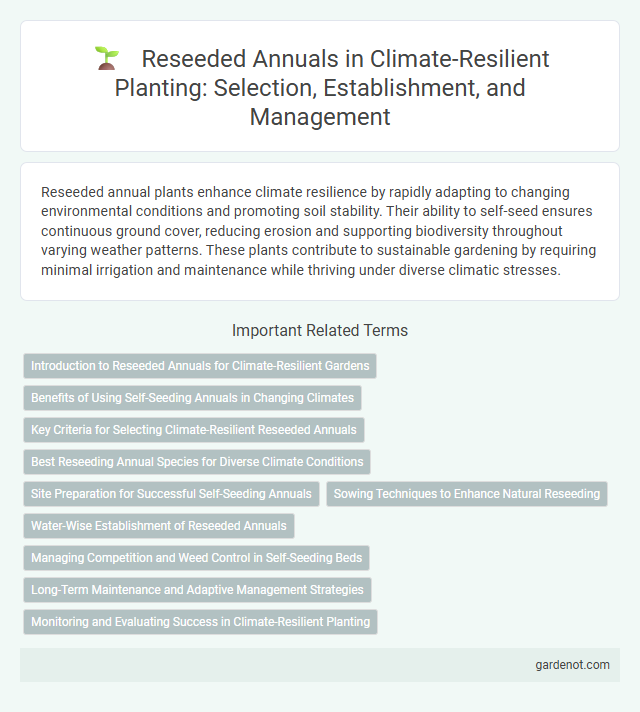Reseeded annual plants enhance climate resilience by rapidly adapting to changing environmental conditions and promoting soil stability. Their ability to self-seed ensures continuous ground cover, reducing erosion and supporting biodiversity throughout varying weather patterns. These plants contribute to sustainable gardening by requiring minimal irrigation and maintenance while thriving under diverse climatic stresses.
Introduction to Reseeded Annuals for Climate-Resilient Gardens
Reseeded annuals play a crucial role in climate-resilient gardens by naturally regenerating each season without the need for replanting. These plants adapt to varying weather conditions, enhancing soil health and reducing water usage through their life cycle. Their ability to self-seed ensures continuous ground cover, aiding in erosion control and supporting local biodiversity in changing climates.
Benefits of Using Self-Seeding Annuals in Changing Climates
Self-seeding annuals enhance climate resilience by naturally regenerating without replanting, reducing labor and seed costs. Their ability to adapt to variable rainfall and temperature patterns supports soil health and maintains ground cover, minimizing erosion in unpredictable climates. These plants promote biodiversity, creating habitats for pollinators and beneficial insects while stabilizing ecosystems under climate stress.
Key Criteria for Selecting Climate-Resilient Reseeded Annuals
Key criteria for selecting climate-resilient reseeded annuals include drought tolerance, rapid germination, and adaptive root architecture to withstand erratic rainfall patterns. Varieties with high genetic diversity and resistance to pests and diseases enhance survival under fluctuating climate conditions. Ensuring seed viability and compatibility with local soil types further supports successful establishment and long-term resilience.
Best Reseeding Annual Species for Diverse Climate Conditions
Reseeded annual species such as ryegrass, oats, and barley demonstrate exceptional adaptability across diverse climate conditions, contributing significantly to soil stabilization and nutrient cycling. These species exhibit rapid germination and growth, enabling quick ground cover that reduces erosion and enhances moisture retention in variable rainfall patterns. Selecting resilient annuals tailored to local temperature ranges and precipitation ensures optimized forage production and ecosystem sustainability under climate stress.
Site Preparation for Successful Self-Seeding Annuals
Effective site preparation is crucial for successful reseeding of annual plants, involving soil loosening and removal of competing vegetation to enhance seed-to-soil contact. Proper soil pH and moisture levels must be maintained to support germination and early seedling growth. Incorporating organic matter improves soil structure and nutrient availability, promoting resilient self-seeding annual establishment in climate-adaptive landscapes.
Sowing Techniques to Enhance Natural Reseeding
Sowing techniques for reseeded annuals focus on optimizing seed-to-soil contact and precise depth placement to enhance natural reseeding success in climate-resilient planting. Techniques such as shallow broadcasting followed by light harrowing or using no-till drills improve germination rates by maintaining soil moisture and reducing erosion. Incorporating native species seeds adapted to local climate conditions ensures sustainable regeneration and increased resilience against extreme weather events.
Water-Wise Establishment of Reseeded Annuals
Reseeded annuals improve climate resilience by requiring less water during establishment due to their rapid germination and adaptability to variable rainfall patterns. Water-wise establishment techniques such as targeted irrigation and soil moisture monitoring enhance seedling survival rates while conserving water resources. Selecting drought-tolerant annual species further optimizes water efficiency and promotes sustainable agricultural practices under changing climate conditions.
Managing Competition and Weed Control in Self-Seeding Beds
Reseeded annual plants in self-seeding beds require strategic management of competition and weed control to ensure optimal growth and climate resilience. Employing techniques such as timely thinning, selective weeding, and mulching reduces resource competition and suppresses invasive species that threaten seedling establishment. Effective weed control enhances soil moisture retention and nutrient availability, supporting robust plant development under variable climatic conditions.
Long-Term Maintenance and Adaptive Management Strategies
Reseeded annual crops enhance soil stability and promote biodiversity, playing a crucial role in climate-resilient planting systems. Long-term maintenance involves regular monitoring of soil health and timely reseeding to ensure consistent ground cover during varying climatic conditions. Adaptive management strategies emphasize flexible scheduling and selection of drought-tolerant seed varieties to optimize resilience against unpredictable weather patterns.
Monitoring and Evaluating Success in Climate-Resilient Planting
Monitoring and evaluating reseeded annual crops involves tracking growth rates, biomass production, and soil moisture retention to determine climate resilience effectiveness. Data collection on plant survival under variable weather conditions helps identify adaptive traits that enhance drought and heat tolerance. Continuous assessment using remote sensing and field surveys ensures timely adjustments to planting strategies, optimizing long-term ecosystem stability and agricultural productivity.
Reseeded annual Infographic

 gardenot.com
gardenot.com